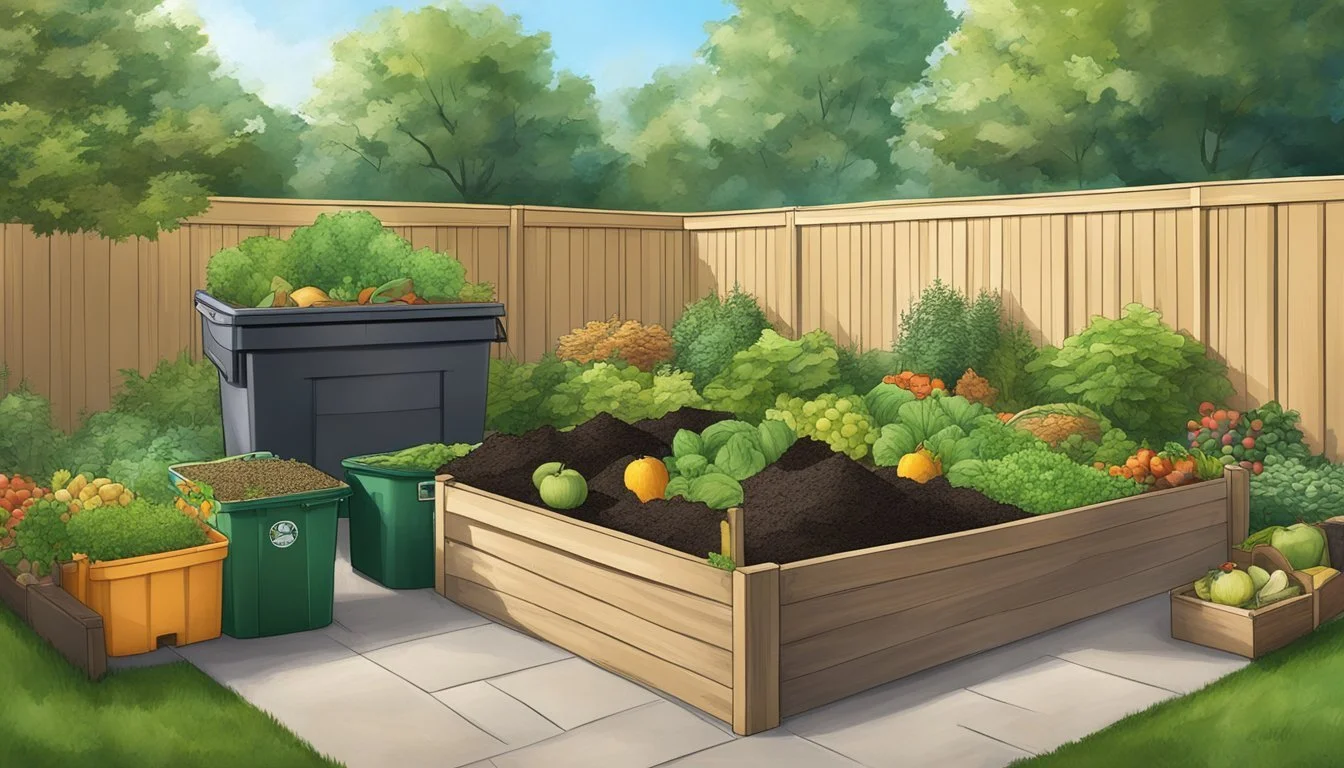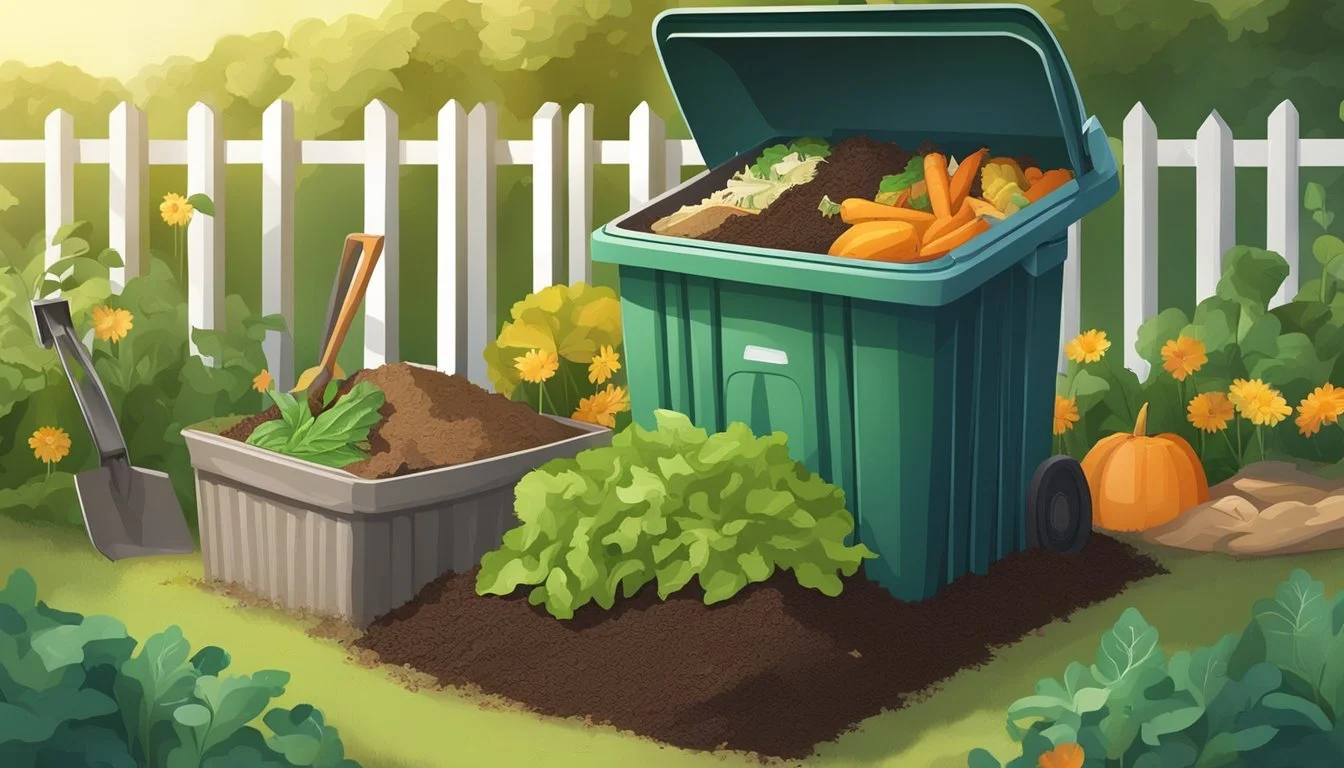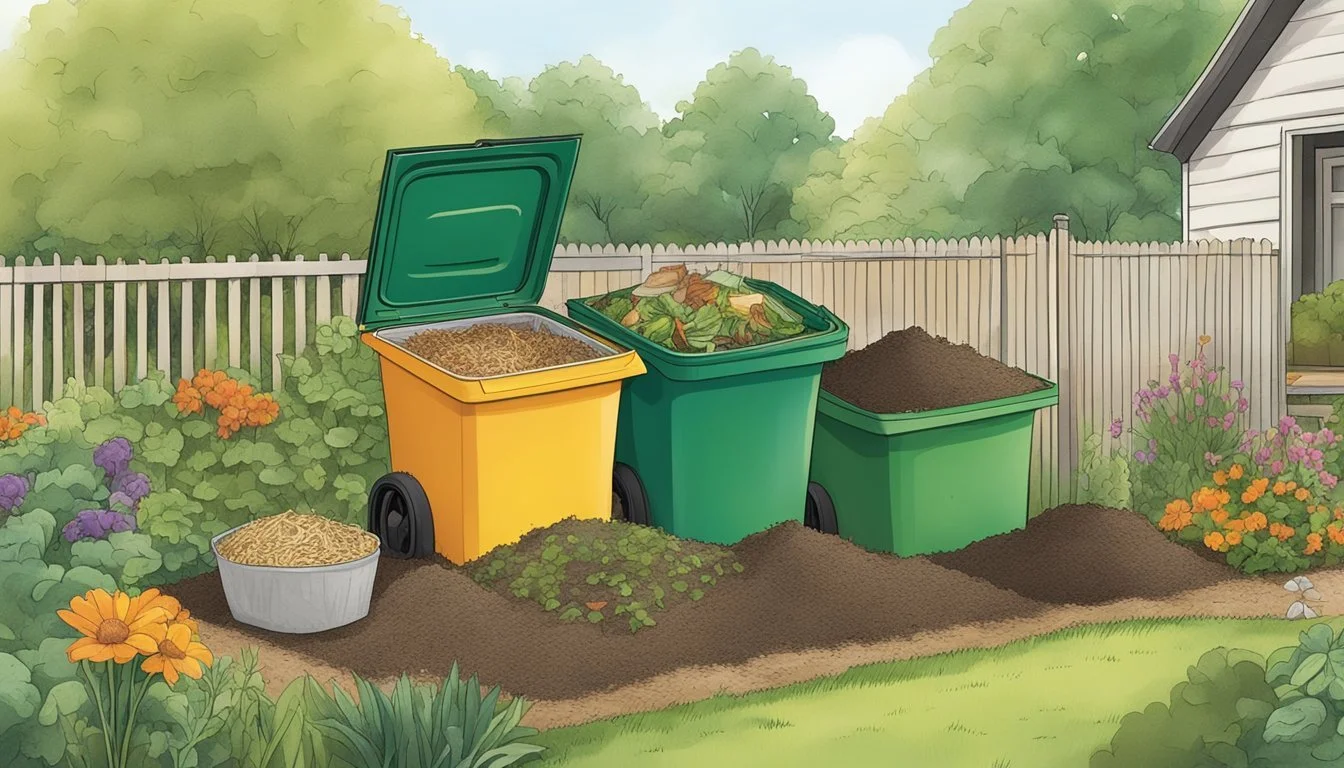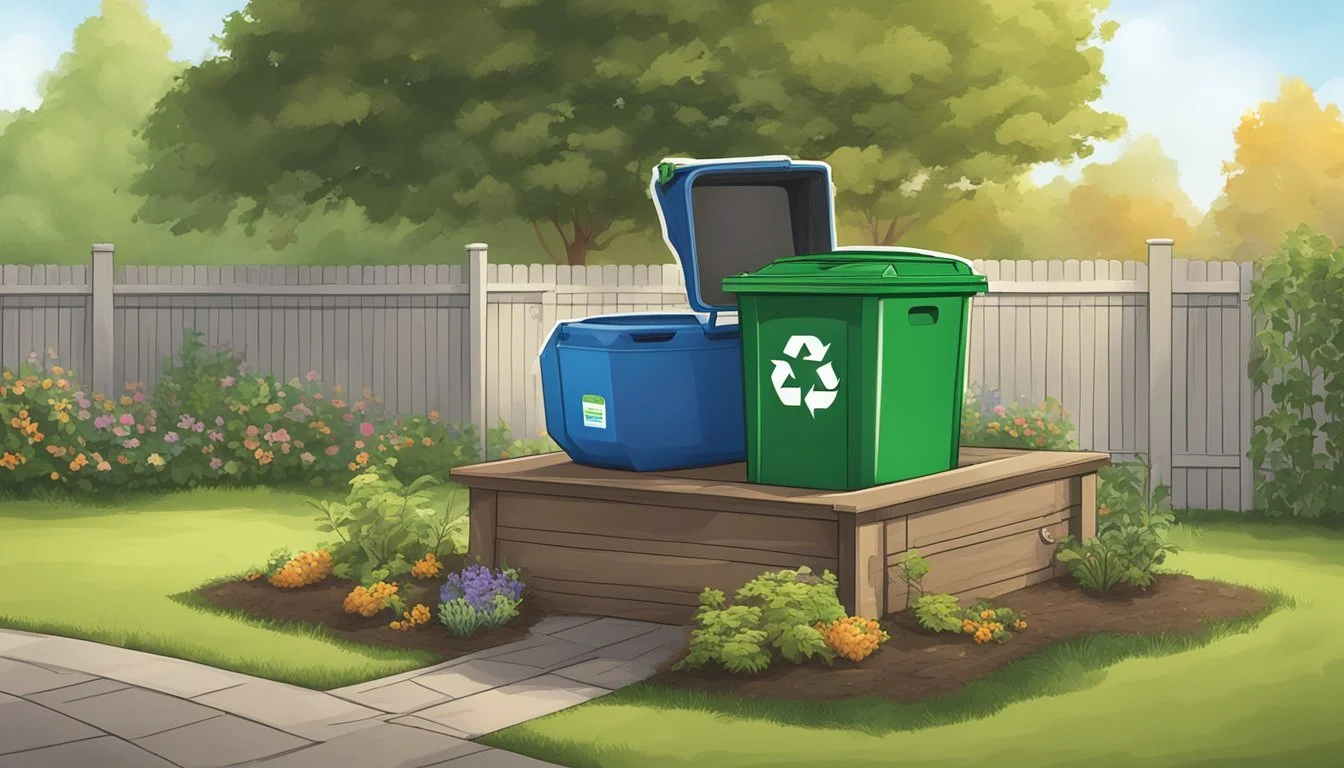Guide to Composting in Warren, MI
Essential Tips for Sustainable Waste Management
Composting in Warren, Michigan, is a practical and environmentally friendly way to manage organic waste, such as kitchen scraps and yard debris. Through the composting process, these materials decompose into a nutrient-rich soil amendment, which can enhance garden health and reduce the reliance on chemical fertilizers. The City of Warren encourages residents to participate in composting efforts by providing guidelines for curbside compost collection and making compost bins available, reflecting a commitment to maintaining a green and sustainable community.
The Environmental Protection Agency (EPA) recognizes composting as a means to divert organic materials from landfills, thereby reducing methane emissions, a potent greenhouse gas. The City of Warren aligns with these environmental goals by setting guidelines for what can and cannot be composted and arranging for seasonal collection services. Residents can contribute to a cleaner environment by adhering to these locally established rules and participating in the city’s composting programs.
By turning organic residuals into compost, not only do Warren's residents support citywide sustainability efforts, but they also contribute to the wider environmental objectives outlined by the EPA. The conversion of organic waste into valuable compost promotes soil health, conserves resources, and fosters a circular economy where nothing goes to waste.
Basics of Composting
Composting is a natural process that converts organic material into a rich soil amendment, providing a sustainable alternative to chemical fertilizers and reducing landfill waste. This section covers the essentials of composting in Warren, MI.
What is Composting?
Composting is the controlled decomposition of organic material, such as leaves, vegetable scraps, and paper products, by microbes. These microscopic organisms break down organic matter, turning it into compost, which is a nutrient-rich soil additive. The ideal compost pile is a balanced mix of greens, rich in nitrogen, and browns, rich in carbon, which together promote effective decomposition.
Benefits of Composting
Composting offers a multitude of benefits for both gardeners and the environment. It enriches the soil, helping retain moisture and suppress plant diseases and pests. Additionally, it encourages the production of beneficial bacteria and fungi that create humus, a key nutrient-rich material for healthy soil. By composting, residents also contribute to mitigating climate change by reducing methane emissions from landfills, a potent greenhouse gas.
Composting Myths Debunked
Many misconceptions surround composting, deterring people from adopting the practice. A common myth is that composting emits a foul smell; however, when managed correctly, a compost pile should have a pleasant, earthy odor. Another misconception is that composting attracts rodents and pests, but a well-maintained compost bin with the proper balance of materials should not. Composting is often seen as labor-intensive, yet once established, a compost system is relatively low-maintenance and rewarding.
Setting Up Your Composting System
In Warren, MI, setting up a composting system at home requires careful selection of the right compost bin, finding the optimal location, and following the city's guidelines for home composting. Adhering to these practices ensures a successful composting process that benefits both your property and the environment.
Selecting a Compost Bin
Choosing a compost bin is the first step in the composting process. Residents need to decide whether to build or purchase a bin. It's important to consider the size of your property and the amount of organic waste you produce. For those looking to get started, the State of Michigan provides a list of registered composting facilities that can offer insights on selecting an appropriate container.
Location and Placement
The location of your compost bin is vital for maintaining a balance of air and water, crucial elements for decomposition. The bin should be placed on a level spot with good drainage and be accessible year-round. It should also be situated far enough from the home to avoid any unpleasant odors but close enough to the house for convenience. The City of Warren has specific guidelines on where to place compost bins and how to manage them throughout the year.
Home Composting Guide
To start home composting, Warren residents can use a bucket or a bin to layer green and brown organic materials. For effective composting, it's recommended to blend two parts green waste, such as kitchen scraps or grass clippings, with one part brown waste like dried leaves. Every layer should be moistened to aid in decomposition but not waterlogged. Regular turning of the compost pile is necessary to introduce air, which accelerates the breakdown process. An at-home composting guide provided by the state can give further detailed instructions on creating and maintaining a compost system.
What to Compost
Composting in Warren, MI, transforms organic waste into a nutrient-rich soil amendment. This section outlines what types of materials to include in your compost pile to ensure a successful decomposition process.
Green Material
Materials known as "green materials" provide nitrogen, an essential component for composting. These include:
Kitchen scraps: Vegetable peels and fruit waste are ideal.
Coffee grounds: They add nitrogen and worms love them.
Grass clippings: Fresh clippings should be mixed in sparingly to prevent matting.
Brown Material
“Brown materials” are carbon-rich and balance the nitrogen from green materials:
Leaves: Dried leaves are a common brown material, adding bulk and helping to aerate the compost pile.
Cardboard: Non-glossy cardboard, like toilet paper rolls, can be shredded and added.
Egg shells: These provide calcium, but should be crushed to speed up decomposition.
Items to Avoid
Certain items should not be composted because they pose health risks or may disrupt the composting process:
Dairy and Meat: These can attract pests and create odor problems.
Bones: They do not break down easily and can attract rodents.
Diseased plants: They might spread pathogens to the finished compost.
Weed seeds: These may not decompose fully and could sprout in your garden later.
Compostable materials are crucial to maintain a balanced compost pile, fostering an efficient decomposition while avoiding substances that cause harm or hinder the process.
Composting Techniques
In Warren, Michigan, residents have various methods at their disposal for effectively breaking down organic waste into nutrient-rich compost. The choice of technique will depend on the desired speed of the process and the level of active management one is willing to commit.
Cold Composting
Cold composting is a low-maintenance method in which organic materials decompose gradually over time. It involves collecting yard waste like leaves, branches, and grass clippings and kitchen scraps excluding meat, dairy, and oils. The key is maintaining a balanced ratio of carbon (browns like dried leaves) to nitrogen (greens like vegetable scraps), usually aiming for a 30:1 ratio. Since it's a passive system, it might not generate enough heat to break down materials quickly, but it will eventually produce cold compost over several months to a year.
Hot Composting
Hot composting is an accelerated method requiring a more active approach. The ratio of greens to browns is crucial in this process as well, to promote a rapid decomposition. Ideally, the pile should maintain a temperature between 135 to 160 degrees Fahrenheit, which is achieved by regular turning to introduce air and ensuring the pile has adequate moisture. This process can produce compost in as quickly as a few weeks to a few months, depending on management.
Vermicomposting
Vermicomposting is an indoor-friendly technique that utilizes earthworms, particularly red wigglers, to break down organic material. The worms consume food scraps and bedding materials, producing worm castings rich in microbes and nutrients. It's important to balance moisture and air flow to avoid odors and to maintain the right environment for the worms. Vermicomposting is effective in converting kitchen scraps into rich compost, without the need for outdoor space, making it ideal for apartment dwellers or those with limited yard space.
Each of these techniques offers a sustainable path for Warren residents to convert their organic waste into valuable compost, contributing to soil health and plant growth, whether one chooses the slow transformation of cold composting, the faster pace and heat of hot composting, or the worm-driven vermicomposting approach.
Maintaining Your Compost Pile
Proper maintenance is crucial for a compost pile’s health and productivity. It involves balancing carbon and nitrogen-rich materials, ensuring adequate aeration through regular turning, and managing moisture levels.
Balancing Greens and Browns
A compost pile requires a balanced mix of greens and browns—that is, nitrogen-rich and carbon-rich materials, respectively. Greens include kitchen scraps and grass clippings, which provide nitrogen, while browns like leaves and cardboard contribute carbon. A generally recommended ratio is 1 part greens to 3 parts browns to maintain optimal compost composition.
The Importance of Turning
Turning the compost pile is essential for oxygenation which accelerates the decomposition process. Micro-organisms responsible for breaking down organic matter need oxygen to thrive; without it, the pile can become anaerobic and slow down the composting process. Turning the pile once a week should suffice, but more or less frequent turns may be required based on the pile’s characteristics and the weather.
Moisture and Aeration
Moisture and aeration are interdependent entities in a compost pile. Adequate moisture is crucial—your pile should feel like a damp sponge, neither too wet nor too dry. To ensure proper aeration and prevent over-compaction, introduce air by creating holes or trenches within the pile. This facilitates microbial activity, which is pivotal for turning your organic materials into nutrient-rich soil.
Troubleshooting Common Issues
When composting in Warren, MI, residents may encounter a few common issues such as unpleasant odors, attracting pests, or compost that fails to heat up. Understanding the balance of green and brown materials, moisture, and adequate air circulation is crucial to addressing these problems effectively.
Odor Management
Causes: A compost pile may begin to smell due to an imbalance in moisture, too much green material like kitchen scraps and grass clippings, or lack of aeration. An excess of green material can lead to a surplus of nitrogen, which when not balanced with carbon-rich brown material, such as leaves or cardboard, causes foul odors.
Solutions:
Adjust the carbon-to-nitrogen ratio by adding brown materials to reduce smells.
Turn the compost pile to introduce air and accelerate the breakdown process.
Pest Prevention
Causes: Pests are attracted to open containers, exposed food waste, and the presence of certain materials like meats or oily foods, which should be avoided in composts. Additionally, an improperly covered compost pile can become a breeding ground for rodents and flies.
Solutions:
Ensure compost consists of the right mix of green and brown materials.
Securely cover food scraps with a layer of brown materials to discourage pests.
Consider using a compost bin with a lid and proper air holes to maintain airflow while deterring animals.
Compost Pile Not Heating
Causes: The decomposition process generates heat, which is a sign that microorganisms are actively breaking down materials. If a compost pile does not heat up, it could be because of insufficient green materials, lack of manure to act as an activator, or inadequate moisture.
Solutions:
Assess the pile for adequate moisture; it should be damp but not soaked.
Introduce green materials or manure to provide nitrogen needed for the microorganisms to thrive.
Mix the materials thoroughly to ensure even distribution of air and moisture.
Using Your Compost
Successful composting results in nutrient-rich soil amendment that can boost the health of your garden. Knowing when the compost is ready and how to apply it ensures your plants fully benefit from this natural fertilizer.
When is Compost Finished?
Finished compost, also known as humus, has a dark, crumbly texture and a pleasant, earthy smell. It typically takes three to six months to reach this point. The original organic materials should no longer be recognizable, and the volume will have decreased by about half. This indicates that the compost is ready to be used.
Applying Compost to Your Garden
When incorporating compost into your garden, it should be mixed with the top six to eight inches of soil. Applying a two to three-inch layer of compost around plants provides them with a slow-release, nutrient-rich supplement. For new gardens, about three to six inches of compost mixed with the existing soil can enhance its structure, water retention, and fertility.
Other Uses for Compost
Apart from enriching garden soil, compost has other uses:
Lawn care: A thin layer of compost can be used as a top dressing on lawns to improve soil quality.
Potting mix: It can be mixed with soil and perlite to create a nutrient-rich potting mix for containers.
Mulching: Compost used as mulch can help retain soil moisture and suppress weeds.
Erosion control: It also can help prevent soil erosion on slopes and in areas with loose soil.
Legal and Environmental Concerns
Composting in Warren, MI, involves observing state regulations and being conscious of how actions can affect the local environment. Understanding the legalities and ensuring one's activities are environmentally sound are essential to a successful and compliant composting practice in the community.
Regulations in Warren, MI
The City of Warren operates under Michigan's composting laws, where yard waste is banned from entering landfills. Compost Season officially begins on April 1st, and residents are encouraged to use their 95-gallon compost totes for curbside collection. The local government provides guidelines for curbside compost to ensure regulatory compliance.
Avoiding Environmental Harm
Illegal dumping can lead to significant environmental harm, affecting storm drains, ditches, and creeks. The Michigan Department of Environment, Great Lakes, and Energy (EGLE) has established DOs and DON'Ts for composting that serve to minimize such risks. Adherence to these recommendations ensures that composting activities do not contribute to pollution or other environmental damage.
Community Involvement
Macomb County Public Works Commissioner Candice S. Miller advocates for community vigilance against practices that could harm the local waterways. Residents and companies are urged to report incidents via the hotline provided by the county. Proactive community involvement ensures that composting supports environmental health, aligning with statewide sustainability goals.
Additional Resources
For residents of Warren, MI looking to deepen their understanding of composting, a variety of resources are available. These resources range from hands-on workshops to online communities that offer a wealth of information and support.
Local Composting Workshops
The City of Warren offers composting workshops designed for gardeners at all levels. These workshops are typically held at community gardens and other local venues. They provide practical, hands-on demonstrations that allow participants to learn the best practices for composting while contributing to a positive atmosphere for environmental stewardship.
Online Composting Communities
For those who prefer digital interaction or cannot attend local events, there are online composting communities provided by the Michigan Department of Environment, Great Lakes, and Energy (EGLE). These online platforms offer forums, articles, and guides where individuals can connect with expert gardeners, ask questions, and share their composting experiences.
Further Reading
EGLE's website features a comprehensive at-home composting guide that serves as an essential reference for anyone wanting to start or improve their composting practice. Additionally, the website provides FAQs and a list of registered composting facilities, which can be beneficial for those looking for more advanced composting information or local composting options.








